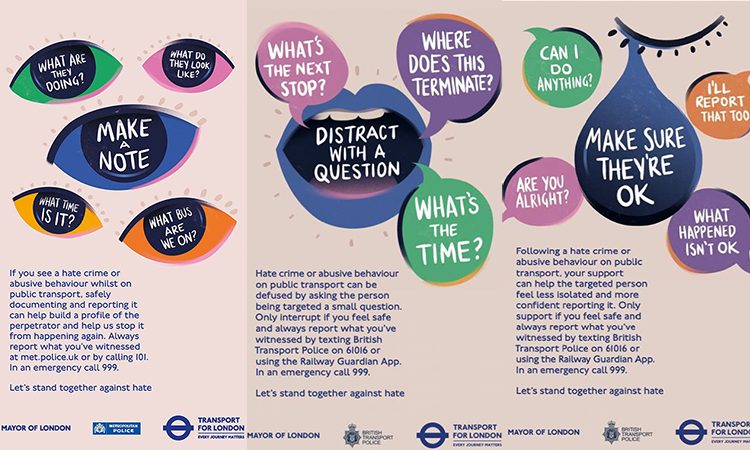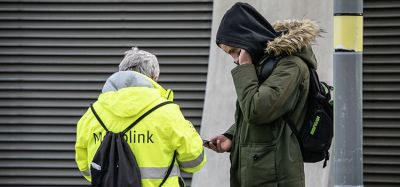TfL launches campaign to encourage active bystanders against hate crime on public transport
- Like
- Digg
- Del
- Tumblr
- VKontakte
- Buffer
- Love This
- Odnoklassniki
- Meneame
- Blogger
- Amazon
- Yahoo Mail
- Gmail
- AOL
- Newsvine
- HackerNews
- Evernote
- MySpace
- Mail.ru
- Viadeo
- Line
- Comments
- Yummly
- SMS
- Viber
- Telegram
- Subscribe
- Skype
- Facebook Messenger
- Kakao
- LiveJournal
- Yammer
- Edgar
- Fintel
- Mix
- Instapaper
- Copy Link
Posted: 14 March 2023 | Intelligent Transport | No comments yet
Through eye-catching posters and public engagement activities, TfL’s campaign aims to create a culture where its customers feel safe and confident to challenge hate whenever they see it.


Credit: Transport for London
Transport for London (TfL) has announced that it has launched a campaign that aims to encourage a culture of active bystanders on its services by highlighting how customers can safely intervene if they witness incidents of hate crime on public transport.
The campaign, in partnership with British Transport Police (BTP) and Metropolitan Police Service (MPS), aims to inspire Londoners to look out for others by learning to recognise the signs of hate crime and providing information on how they can help, ignoring the offender and focusing on the person that is being targeted.
TfL takes a zero-tolerance approach to all forms of abuse on its network and is working hard to ensure its customers and staff are safe, feel safe and have the confidence to report any incident knowing that it will be taken seriously and investigated.
Research from London Travelwatch Personal Security’s report, 2021, found that 63% of passengers would feel more confident in intervening in an incident if they had more information on how to help. Research from Communities Inc has also shown that most people want to help, but don’t know how, or aren’t sure if the situation is serious enough.
TfL’s campaign includes eye-catching posters that can be seen across the network that sets out clear guidance for customers on how they can safely intervene if they witness hate crime. The following actions are highlighted by the campaign as ways customers can help, but only if they feel safe to do so:
- Distract with a question – ignoring the offender and asking the victim an unrelated question such as ‘what’s the time?’, ‘what’s the next stop?’ or ‘where does this terminate?’
- Make a note of what’s happening and report it – including the location, bus route or Tube line, time etc
- After the incident, check in with the victim and ask if they are ok and that what happened to them wasn’t ok.
TfL’s new campaign to help Londoners recognise signs of sexual harassment on public transport
The campaign will also include editorial partnerships and other communications, including sponsored podcasts, as well as public engagement activity at King’s Cross and Walthamstow stations. The campaign has been informed by research, including focus groups, the expertise of hate crime campaign groups and the police.
TfL continues to work closely with the police to support the investigation of hate crimes on its public transport network to bring offenders to justice. TfL has stated that it is not asking customers to police the network, with more than 2,500 police and police community support officers and 500 TfL enforcement officers patrolling the network to improve the safety of customers and staff and re-assure those who may feel vulnerable.
“Everyone has the right to use public transport without fear of abuse and TfL takes a zero-tolerance approach to hate crime,” said London’s Deputy Mayor for Transport, Seb Dance. “Londoners have told us that they want to support each other if they witness a hate crime, and they would feel more confident doing so if they had information on the best and safest ways to help. That is why TfL’s campaign is so vital – it provides helpful advice to anyone witnessing a hate crime and enables all of us to intervene, safely.”
Siwan Hayward, Director of Security, Policing and Enforcement, said: ”We’re not asking customers to police the network, that’s the job of our police partners with our support, but we do know that customers also want to support one another if something doesn’t feel right. If it is safe to do so, there are a number of small actions customers can take that can make a huge difference. Through some safe and practical actions, bystanders can prevent or discourage an incident from escalating. Reporting incidents will help us to take action against offenders and prevent it from happening again.”
If you liked this, you may also be interested in:
▶ LA Metro deploys hundreds of ambassadors to enhance customer experience and public safety
▶ Transport Scotland report recommends changes to enhance women’s safety on transit
Related topics
Passenger Experience, Public Transport, Vehicle & Passenger Safety
Related modes
Bus & Coach, Tube
Related cities
London
Related countries
United Kingdom
Related organisations
British Transport Police (BTP), London TravelWatch, Metropolitan Police Service (MPS), Transport for London (TfL)
Related people
Seb Dance, Siwan Hayward








